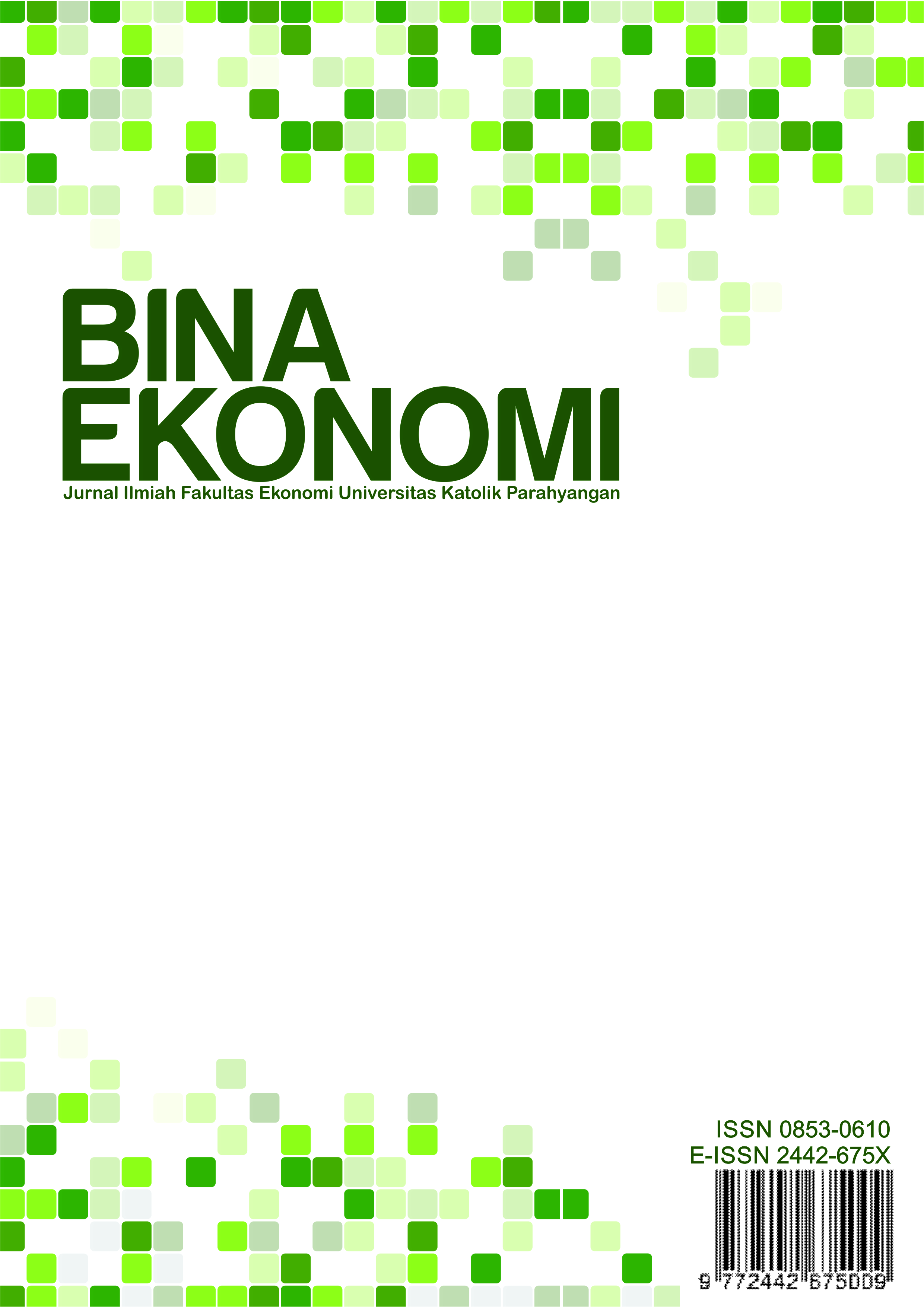APAKAH INSTITUSI PENTING UNTUK PERTUMBUHAN EKONOMI ? BUKTI EMPIRIS DARI ASEAN
DOI:
https://doi.org/10.26593/be.v28i2.7381.142-154Abstract
Institutional quality plays an important role in supporting economic growth through the reduction of transaction costs. This study aims to analyse the effect of institutional quality on economic growth in ASEAN. The data used is a panel of ASEAN countries for the period 2002-2020. Three variables are used as proxies for institutional quality, namely regulatory quality, rule of law, and voice and accountability, while GDP per capita is a proxy for economic growth. Pooled least squares (PLS) was chosen to estimate the relationship between institutional quality and economic growth. The findings of this study show that all institutional quality variables have a significant effect on economic growth in ASEAN. Specifically, rule of law and voice and accountability exert a significantly positive impact on economic growth. However, it is noteworthy that the quality of regulatory frameworks exhibits a significantly negative impact on economic growth in the ASEAN region. The results of this study confirm the institutional role theory which shows that institutions play an important role in promoting economic growth. This study implies that the formulation of regulations or laws should not overlap so that the execution of regulations can run systematically. In addition, it is imperative to foster public participation as a means of government oversight and quality institutions can create a conducive climate for investment.
References
Acemoglu, D., & Robinson, J. A. (2012). Why Nations Fails : The Origins of Power, Prosperity and Poverty. Crown Publishers.
Afonso, O. (2022). The impact of institutions on economic growth in OECD countries. Applied Economics Letters, 29(1), 63–67. https://doi.org/10.1080/13504851.2020.1855304
Beschel, R. P., Dyer, P., & Schaider, I. (2023). Voice , Accountability , and Economic Growth in the MENA Region. April, 18.
Ganau, R. (2017). Institutions and economic growth in Africa: a spatial econometric approach. Economia Politica, 34(3), 425–444. https://doi.org/10.1007/s40888-017-0057-3
Gujarati, D. N., & Porter, D. C. (2009). Basic Econometrics. In A. E. Hilbert (Ed.), Introductory Econometrics: A Practical Approach (fifth edit). McGraw-Hill.
Hall, J. C., Sobel, R. S., & Crowley, G. R. (2010). Institutions , Capital , and Growth. Southern Economic Journal, 77(2), 385–405. https://www.jstor.org/stable/pdf/40997138.pdf
Haque, M. E., & Kneller, R. (2015). Why does Public Investment Fail to Raise Economic Growth? The Role of Corruption. Manchester School, 83(6), 623–651. https://doi.org/10.1111/manc.12068
Iqbal, N., & Daly, V. (2014). Rent seeking opportunities and economic growth in transitional economies. Economic Modelling, 37, 16–22. https://doi.org/10.1016/j.econmod.2013.10.025
Iskandar, A. S., Muhajir, M. N. A., Hamida, A., & Erwin, E. (2023). The Effects of Institutions on Economic Growth in East Asia. Jurnal Ekonomi Dan Studi Pembangunan, 15(1), 87. https://doi.org/10.17977/um002v15i12023p087
Jain, P. (2021). Institutions and economic development: Understanding the Evidence from Indian States. 31–44.
Mankiew, N. G. (2010). MACROECONOMICS (7th Editio). Worth Publishers.
Masuch, K., Moshammer, E., & Pierluigi, B. (2017). Institutions, public debt and growth in Europe. Public Sector Economics, 41(2), 159–205. https://doi.org/10.3326/pse.41.2.2
Nawaz, S. (2015). Growth effects of institutions: A disaggregated analysis. Economic Modelling, 45, 118–126. https://doi.org/10.1016/j.econmod.2014.11.017
Nguyen, C. P., Su, T. D., & Nguyen, T. V. H. (2018). Institutional Quality and Economic Growth: The Case of Emerging Economies. Theoretical Economics Letters, 08(11), 1943–1956. https://doi.org/10.4236/tel.2018.811127
Purba, E. N., & Farah, A. (2021). Institusi Dan Pertumbuhan Ekonomi. Jurnal Dinamika Ekonomi Pembangunan, 4(2), 116–123. https://doi.org/10.14710/jdep.4.2.116-123
Radulović, M. (2020). The Impact Of Institutional Quality on Economic Growth: A Comparative analysis Of The Eu And Non-eu countries Of Southeast Europe. Economic Annals, 65(225), 163–181. https://doi.org/10.2298/EKA2025163R
Salawu, M. B., Yusuff, A. ., Salman, K. ., Ogunniyi, A. ., & Rufa, A. . (2018). Does Governance Cause Economic Growth in sub-Saharan Africa? Global Journal of Human-Social Science: E Economics, 18(1).
Sari, V. K., & Prastyani, D. (2021). The Impact of the Institution on Economic Growth: An Evidence from ASEAN. Jurnal Ekonomi Pembangunan, 19(1), 17–26. https://doi.org/10.29259/jep.v19i1.12793
Shah, Q., Zubair, S., & Hussain, S. (2020). The impact of institutions on economic growth in selected developing countries: An analysis based on Bayesian panel estimation. Journal of Applied Economics and Business Studies, 4(4), 251–272. https://doi.org/10.34260/jaebs.4412
Tiwari, A., & Bharadwaj, T. (2021). Assessing the impact of institutions on economic growth in the BRICS countries. BRICS Journal of Economics, 2(4), 30–46. https://doi.org/10.38050/2712-7508-2021-4-2
Uddin, M. A., Ali, M. H., & Masih, M. (2020). Institutions, human capital and economic growth in developing countries. Studies in Economics and Finance, 38(2), 361–383. https://doi.org/10.1108/SEF-10-2019-0407
Yeager, T. J. (1999). INSTITUTIONS, TRANSITION ECONOMIES, AND ECONOMIC DEVELOPMENT. Political Economy of Global Interdependence.
Yıldırım, A., & Gökalp, M. F. (2016). Institutions and Economic Performance: A Review on the Developing Countries. Procedia Economics and Finance, 38(October 2015), 347–359. https://doi.org/10.1016/s2212-5671(16)30207-6
Yudanti, A., & Setiadi, W. (2022). Problematika Pembentukan Regulasi Indonesia Dalam Perencanaan Pembentukan Regulasi Dengan Perencanaan Pembangunan Daerah. Volksgeist: Jurnal Ilmu Hukum Dan Konstitusi, 5(1), 27–40. https://doi.org/10.24090/volksgeist.v5i1.4973
Yustika. (2013). New Institutional Economics Atau Ekonomi Kelembagaan (Definisi, Teori Dan Aplikasi). Wordpress. dari https://kelembagaandas.wordpress.com/ekonomi-kelembagaan/ahmad-erani-yustika/


